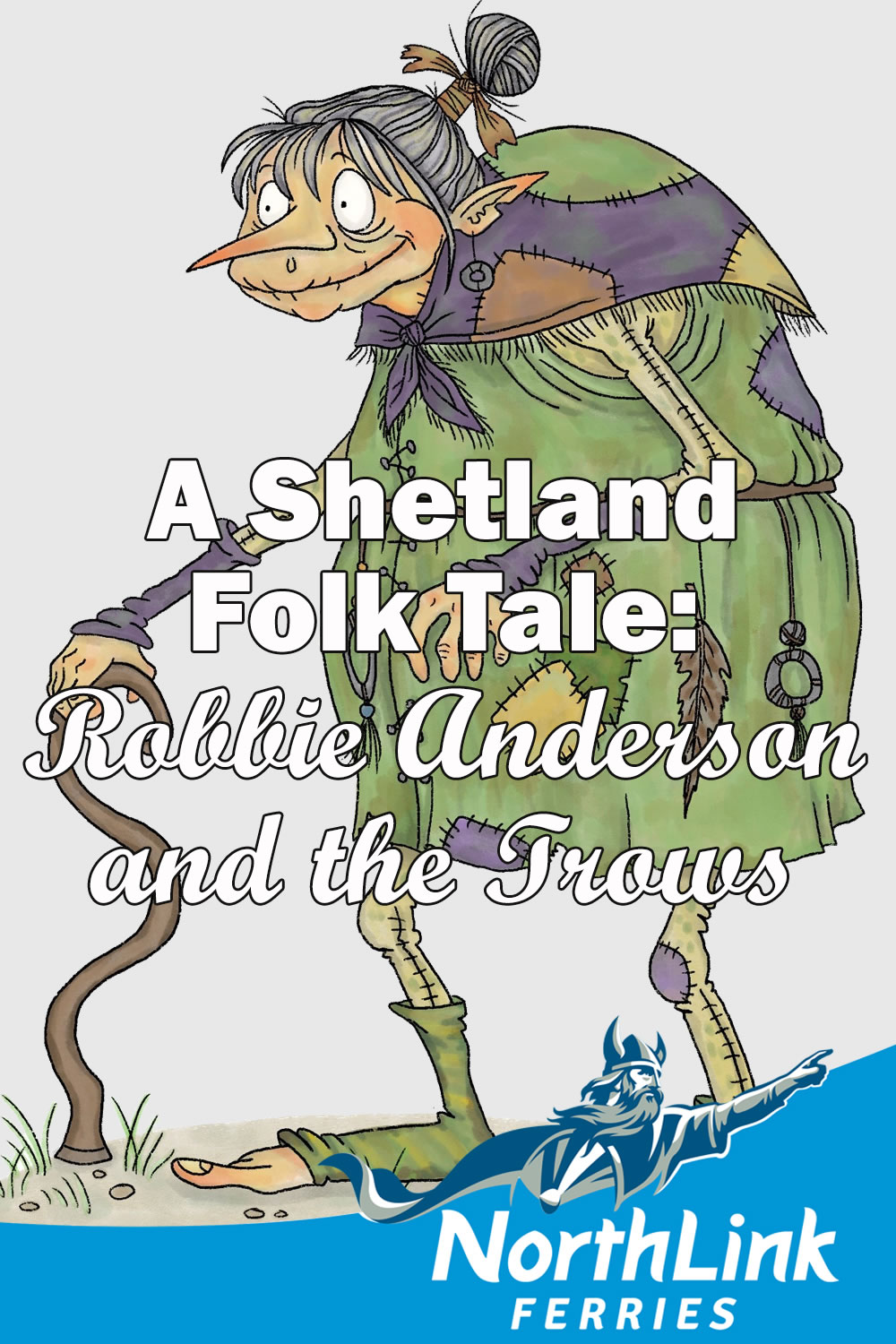A Shetland Folk Tale: Robbie Anderson and the Trows
Folk tales were told in the Northern Isles in times gone past which featured magical creatures living in the landscape. We hope you enjoy this traditional tale from Shetland, Robbie Anderson and the Trows, released to celebrate Scotland’s Year of Stories.
One day Robbie declined to go fishing, as he had work on the farm that needed his attention. The men set off, but without Robbie they caught very few fish. Two days later Robbie went back with them and they had fish galore. This got Robbie thinking. He wondered if it had anything to do with the trows.
Robbie Anderson lived in Cullivoe in the island of Yell with his wife and children. The Andersons were poor people, eking out a living from the land and fishing. Robbie was famous for being the best fiddle player in the parish.
One Owld Yul Een (Old Christmas Eve, 7th January) Robbie was returning from feeding his sheep when he was accosted on the path by a tiny man with red hair that Robbie knew was a trow (a fairy). Robbie didn’t trust the trows and wanted nothing to do with them.
“Robbie” he said, “I want you to play at our Owld Yul Foy.” (foy = party)
“I’m sorry,” Robbie replied, “On Owld Yul Een I go to visit friends and play for them.”
The trow said, “If you change your mind I will make it worth your while. But if you do play for us you must not tell anyone.”
Robbie found the decision really hard, but when night came he took his fiddle under his arm and set off towards the trows’ home. The door in the hillside was open and there were the sounds of laughter and glasses clinking. The same tiny red haired trow was there to greet him.
The trows loved Robbie’s music and Robbie played like he had never played before, in fact, some of the tunes that he played were unknown to him. He played until morning when he was left on his own. The trows had promised pay him, but Robbie got nothing, not even a thank you. He dreaded the reunion with his wife; he had refused to tell her where he was going. It was not a warm welcome that Robbie got from his wife.
The last day of January brought a blizzard, one of the biggest snowfalls in living memory. When the sky cleared the frost was severe. The sea was like a mirror and Robbie’s neighbours suggested that they try some fishing. When they got to the fishing-grounds the fish were plentiful and easy to catch, in fact they took the hooks so keenly that they didn’t even need to bait them. So it was for several days, Robbie and his neighbours got enough fish to keep them going for a while and even had enough to give to the old people in the parish.
One day Robbie declined to go fishing, as he had work on the farm that needed his attention. The men set off, but without Robbie they caught very few fish. Two days later Robbie went back with them and they had fish galore. This got Robbie thinking. He wondered if it had anything to do with the trows.
The thaw came with gales and rain. The men had to go to the hills and look for the sheep. Everyone had losses, except Robbie. All his sheep were alive and well. Gales in September destroyed the crop, except for Robbie’s corn, which stood tall and heavy with grain.
On Owld Yul Een, Robbie took the same path as he had done the previous year. He met the same tiny red haired trow and was again invited to played at their foy. And so it went on, year after year. Through his good luck Robbie and his family were no longer poor.
One year the trow failed to appear, although Robbie walked the path several times. That evening Robbie took his fiddle and set out for the trows’ home. The place was as silent as the grave, only a small fire was burning. Beside it an old trow woman was sitting. “Thank you for coming, Robbie, but you are not needed.” “Where is everyone?” he asked.
“Everybody has left,” she said, “There is a new minister in the place and he hates us trows and preaches against us. My folk have gone to the Faroe Islands to be away from him, but I’m too old to move and I’m a bit deaf, so I can’t hear him anyway.”
Slowly, Robbie made is way home. His wife was surprised to see him, but they went to their neighbours’ houses and he played for them, just like he had always done.
He had no more trowie luck from that day forward, he was an ordinary man again, like everyone else.
 By Tom Muir
By Tom MuirTom is a champion of folk tales from Orkney, bringing them back to the public through books and as a professional storyteller. His day job is at the Orkney Museum. Along with his wife, Rhonda, he runs Orkneyology.com to bring more stories into the world at a time when they are much needed.
With grateful thanks to Ellen Forkin for her Old Trow Woman illustration.

Pin it!
